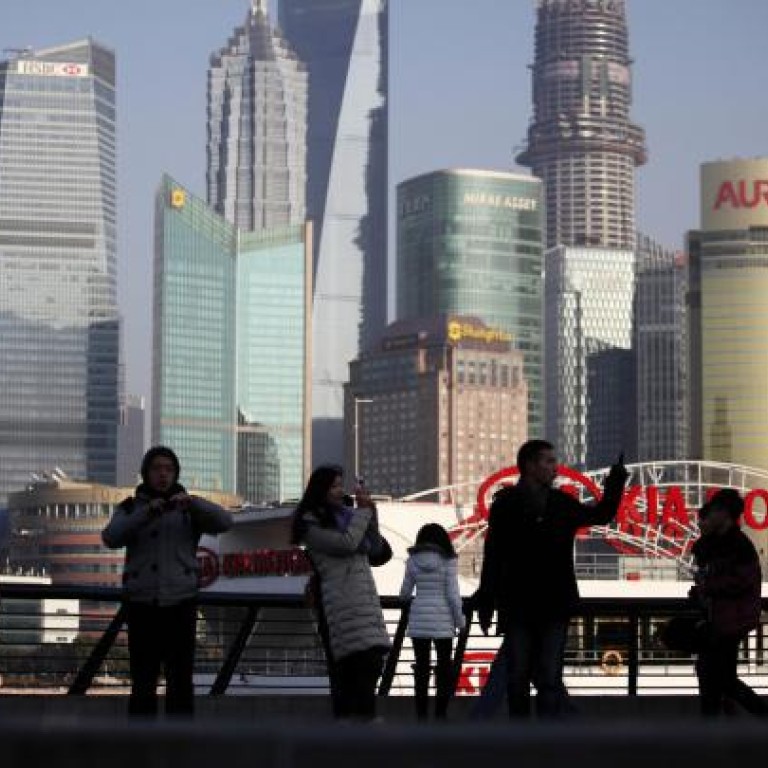
China targets quality expansion
Mainland provinces are setting lower growth targets this year as the central government seeks to rein in liquidity and soaring debts
Almost half of the mainland provinces are setting their growth sights lower in the wake of the central government's emphasis on the quality of expansion over speed, a sign of an increased focus on tackling rising debt.

Scaling back regional politicians' growth-at-any-cost attitudes may limit the country's rebound from its weakest expansion in 13 years. At the same time, it may mitigate concerns that rising local-government defaults will threaten the financial system and pollution will worsen as leaders complete a once-a-decade power handover this month.
"In the future, the central government may look at more indicators, including pollution and debt, in assessing local officials," said Zhang Zhiwei, the chief China economist at Nomura in Hong Kong and a former researcher for the International Monetary Fund. "You can't continue the traditional way of accumulating heavy debts to push up GDP in your term and then leave the trouble to your successor."
The GDP targets may dampen previous optimism that the mainland economy would get a boost this year from the traditional rush of new projects by officials appointed as regional leaders. Instead, rising political stars including Hu Chunhua in Guangdong and Sun Zhengcai in Chongqing have set lower goals, supporting incoming President Xi Jinping's focus on "quality and efficiency" of growth.
Premier Wen Jiabao will formally announce this year's countrywide economic targets when he delivers his final annual work report next week to the national legislature, which is set to approve appointments of Xi as president and Li Keqiang as Wen's successor. The government would keep the growth target at 7.5 per cent this year, Bloomberg reported in December, citing two bank executives and a regulatory official briefed on the matter.
Mainland leaders said after their annual central economic work conference in December that they would seek "sustained and healthy development" and omitted previous mentions of targeting "relatively fast growth".
The central government has not published a national figure for local debt since the audit office said in 2011 that it was 10.7 trillion yuan (HK$13.2 trillion) at the end of 2010. Wen said in March last year that the level was little changed in 2011. Adam Wolfe, a director of emerging Asia at Roubini Global Economics in London, estimates debt of 17.5 trillion yuan.
A rebound in property prices and record credit expansion are putting pressure on the government to rein in liquidity and debt.
A research arm of the country's top economic-planning agency said this week that authorities should drain more cash from the financial system and regulators needed to enhance oversight of banks' off-balance-sheet business. The People's Bank of China in December highlighted the need to control risks as an objective, a possible sign of growing concern that a surge in non-bank lending would lead to defaults.
A rebound in the benchmark Shanghai Composite Index has stalled on speculation that the government will tighten policies. The gauge has fallen 5 per cent since February 6, following a 24 per cent gain over two months.
Regional government officials might still be under pressure to pursue growth, "although some leaders in coastal areas have started to pay more attention to quality", said Ding Shuang, a Hong Kong-based senior China economist with Citigroup.
Local officials had also set lower growth targets in anticipation that the central government would gradually make monetary policy less loose, said Ding, who previously worked for the central bank and the IMF.
Regional expansion targets this year range from 7.5 per cent in Shanghai to 14 per cent for Guizhou. Last year, 14 provinces missed their growth goals, according to Nomura.
The provinces are known for reporting growth rates that often exceed the national pace calculated by the central government. Their combined GDP for last year was 5.8 trillion yuan more than the countrywide figure published by the National Bureau of Statistics, according to the state-run . That was about the size of Indonesia's economy.
The mainland economy, the world's second-largest, expanded 7.8 per cent last year, compared with the average 10.6 per cent rate over the previous 10 years. Economists forecast a pickup to 8.1 per cent this year, based on the median estimate.
Any further slowdown resulting from lower growth goals or other forces will show how willing Xi and Li are to put up with weaker expansion.
"When China's growth dips to 7 per cent, it will pose a testing moment for the new leadership," Zhang said. "The current leadership proved that they can't tolerate any growth rate below that, and now the eyes are on the new leaders."

